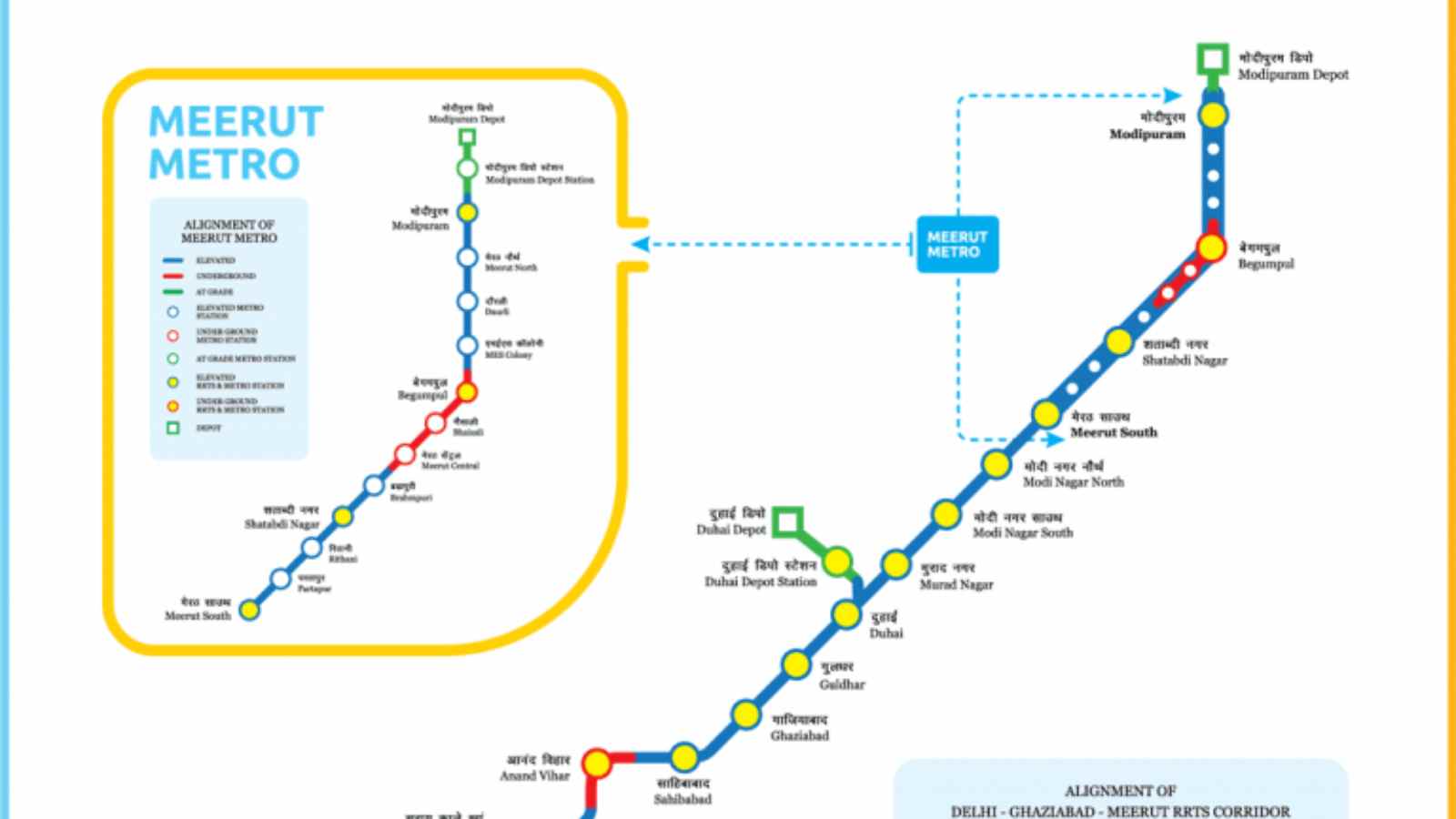Delhi Meerut Regional Rapid Transit System: The Delhi–Meerut Regional Rapid Transit System (Delhi–Meerut RRTS) is a newly constructed, high-speed train line. It will link locations such as Delhi, Ghaziabad, and Meerut. This train will travel at a decent speed, but not too fast, and construction is currently underway. The project is administered by the National Capital Region Transport Corporation (NCRTC), and it is a component of the RapidX initiative. The maximum speed of the train will be 180 kilometres per hour, and the journey from Delhi to Meerut will take less than one hour. The entire endeavour will cost approximately 30,274 crore, and the train will make 22 stops to pick up and drop off passengers. In addition, there will be two Depots in Duhai and Modipuram for the storage of trains.
History and Beginning of Delhi Meerut Regional Rapid Transit System
The construction on this train line began on March 8, 2019, following a special event. The activity was commenced by Prime Minister Narendra Modi placing a special stone in the ground. The railway line will also facilitate movement within the city of Meerut. Approximately 21 kilometres of the railway line in Meerut will be dedicated to short distance travel within the city.
Soon to Commence and Fully Functional
By March 2023, it is anticipated that a lesser portion of the train line, which is approximately 17 kilometres long, will be operational. The entire 82-kilometer-long train line should be fully operational by June 2025. This means that portions of the train line can be utilised before the entire project is complete.
Some Difficulties
There was a time when some individuals believed that a Chinese company should not assist in the construction of the railway line due to a dispute that occurred in Galwan Valley. Now, however, a Gujarat-based corporation called Alstom manufactures the trains.
Activate Metro PCS your Phone and SIM card: Easy Activation Process
Where the Train Is Headed
There will be a total of 14 sites where the train can stop. The train will pass through numerous locations. Sarai Kale Khan, New Ashok Nagar, Anand Vihar, Sahibabad, Ghaziabad, Guldhar, Duhai, Muradnagar, Modinagar South, Modinagar North, Meerut South, Shatabdi Nagar, Begumpul, and Modipuram are a few of these locations. In addition, there will be two Depots where trains can be stored, in Duhai and Modipuram.
Both Above and Below Ground
Approximately 68 kilometres of the railway line will be elevated like a bridge. Approximately 14 kilometres will be constructed underground as a conduit. There will also be a portion, approximately 1.5 kilometres in length, where the train line is on the ground. This component is required to connect the Duhai and Modipuram Depots.
How Quickly and Where it Ends
The train will be capable of speeds of up to 180 kilometres per hour. But when it is operating, it typically travels at 160 kilometres per hour. This is still extremely quick! The train will halt at various locations, and it will travel at an average speed of about 100 kilometres per hour, including the time required to stop at each station.
The Beginning and the End
In Delhi, the train line originates at a location known as Sarai Kale Khan. It will travel through a number of Delhi, Ghaziabad, and Meerut neighbourhoods before arriving at Modipuram in Meerut. Sarai Kale Khan will become a hub of transportation thanks to the addition of a metro station, bus terminal and train station.
When and Where Will It Be Available?
Some sections of the train line will shortly be operational. The 38-kilometer section between Sahibabad and Meerut South is scheduled to begin construction in January 2024. The approximately 16-kilometer section between Hazrat Nizamuddin and Sahibabad is also scheduled to begin in January 2024. The 37-kilometer stretch between Meerut South and Modipuram should be completed by July 2024.
More Stations and Convenience
There will be 16 possible locations for the train to halt. These will facilitate the transfer of passengers from trains to other modes of transportation, such as the Delhi Metro, Indian Railways, and buses. At stations including Anand Vihar, Sahibabad, and Shaheed Sthal, this will occur.




